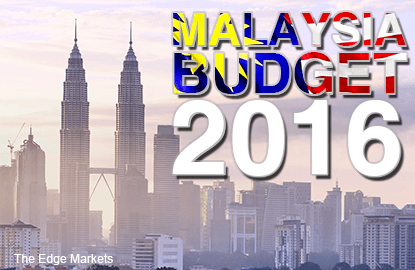
This article first appeared in The Edge Malaysia Weekly, on October 12 - 18, 2015.
MALAYSIA waits with bated breath for another federal budget announcement come Oct 23. Early indications are that the Ministry of Finance (MoF) will be more generous with its handouts in Budget 2016. After all, it is on the final leg of economic transformation under the 11th Malaysia Plan (11MP) and plans to spend its way to success.
For the man in the street, it is time to draw up a wish list and wait for the favours that the MoF puts in the yearly goody bag.
Topping the government’s spending list would be the backbone of Malaysia’s pump-priming — infrastructure expenditure. With much remaining unaccomplished under 10MP, analysts say there is no reason to let up on spending in this area. “Construction is one of the economic activities that contribute to the national economy. The government should not compromise on infrastructure development expenditure because that would have a negative impact on the construction sector, its supporting industries and the spillover effects,” says Jorah Ramlan, visiting lecturer at Asia Europe Institute, Universiti Malaya.
Over the next five years, the government will be splurging on the construction of an additional 3,000km of paved roads in rural areas, at least five new highways, MRT lines, LRT Line 3, airports and ports. It also aims for electricity and potable water to reach 99% of the population and build affordable homes for the middle and lower-income groups. Some of these projects will feature in Budget 2016.
Direct government spending may also be directed at small and medium enterprises (SMEs) through soft loans. Yeah Kim Leng, dean of the School of Business at Malaysia University of Science and Technology, says investment in start-ups and high-value businesses will push private sector growth in the future.
Taxes offer the government endless stimulus opportunities. When pressed, the MoF has proved itself willing to throw out the old rule book for tax regimes in favour of new ones. For example, under Budget 2000, then prime minister and minister of finance Tun Dr Mahathir Mohamad changed the country’s basis of taxation from the preceding year basis to the current year basis. A result of this change was the waiver of tax on income derived in 1999, freeing up disposable income for households.
MIDF Research says a personal income tax cut is unlikely next year as rates for assessment year 2016 has already been reduced by 1% to 3%. Certainly, there may be good news for the year after next, like the tax cuts announced in Budget 2014, observers say.
In the meantime, businesses can expect further tax incentives in Budget 2016 to encourage activity apart from the special economic measures announced by Prime Minister Datuk Seri Najib Razak on Sept 14, exempting 90 categories of spare parts, consumables and research equipment from import duty.
The addition of new items to the zero-rated list of products under Budget 2016 is not entirely out of the question. But this could compromise the state’s revenue collection.
To spur demand, reckons UOB Kay Hian Research, the government may resort to short-term measures that do not cost it money, such as providing greater investment incentives, like in 2009 when it cut employees’ statutory contribution rate to the Employees Provident Fund from 11% to 8% for two years.
But few steps would satisfy the masses the way cash handouts would. The MoF will continue to provide direct financial aid to lower-income households for the fourth year running. Rosnani Rasul, head of research at M&A Securities, says there is a chance that the government will increase the payout per household from the current RM950 for the lowest-income group. This has been the case in the past four years.
There is no guarantee that pump-priming will afford Malaysia the inclusive economic success it needs, but with a year in office fraught with deteriorating economic conditions, a sliding ringgit and political noise, packing Budget 2016 with the right goodies would see the return of the feel-good factor to the country.
Save by subscribing to us for your print and/or digital copy.
P/S: The Edge is also available on Apple's AppStore and Androids' Google Play.